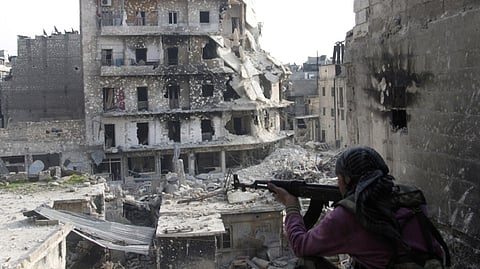All eyes on the Syrian battlefield
Moscow may be prompted to quietly talk about ways to arrange the process of Al Assad’s departure from office

US President Donald Trump appears to be determined to put into action his initial reaction to the murderous use of chemical weapons against civilians in the Syrian town of Khan Shaikhoun by changing Washington’s hands-off policy in the Syrian conflict to a more proactive one. The Syrians are desperately in need of a change in US policy to counter the almost exclusive Russian military and political support to the Syrian regime in Damascus. Secondly, such American action would most certainly help restore the world’s confidence in US leadership that has been lost since President Trump’s arrival in the White House.
The US president has condemned the brutal killing of 85 civilians in Syria, the clear majority of them children, in the northern province of Idlib, in what seemed to be a chemical weapons attack by the regime’s air force. It was an “affront to humanity” is how Trump reacted to the attack, adding: “When you kill innocent children, innocent babies, little babies... that crosses.. many lines.”
This brought to mind the “red line” statement made by former US president Barack Obama, when in August 2013 the forces of Bashar Al Assad used chemical weapons that resulted in the killing of hundreds of civilians in Al Ghouta district. Obama was dissuaded then from taking any punitive action against the Syrian regime by the intervention of Russian President Vladimir Putin, a staunch supporter of Bashar Al Assad, and who pledged to clear Syria of all of its chemical weapons arsenal.
Trump, while condemning the recent use of chemical weapons by the Syrian regime, has avoided mentioning Russia. However, he has left that to his UN representative in the Security Council who has accused Moscow of covering up for Damascus. In a heated debate, the US Ambassador to the UN Nikki Haley said, “Time and time again Russia uses false narrative to deflect attention from their ally in Damascus.” Threatening to resort to possible unilateral action, she added: “When the UN consistently fails in its duty to act collectively, there are times in the life of states that we are compelled to take our own action.”
Of course, Russia, unsurprisingly, has denied any knowledge of using nerve gas by Al Assad. But Turkey’s Justice Minister Bekir Bozdag confirmed it. Post-mortem examinations carried out on three victims of the attack in Turkey “confirmed the use of chemical weapons and that Al Assad’s air forces were responsible,” he said.
So is it safe to assume that we are on the verge of a significant change in US policy towards Syria? It is difficult to clearly determine that at this stage, but based on Trump’s reaction, Haley’s statement in the Security Council and the latest statement by US Secretary of State Rex Tillerson that there is “no role for Al Assad in Syria’s future” are all indications of a potential departure from the previous US policy on Syria.
The change of tone is remarkably clear. From a policy of “not in favour of removing Al Assad” last week to a policy of Al Assad “crossing so many lines...” and obvious threat of “taking unilateral action” only last Wednesday, must mean that the White House has made up its mind. The US president has gone as far as to describe Al Assad as “a disgrace to humanity”. The shift in policy is equally remarkable. In 2013, Trump in a tweet had warned the Obama administration against attacking Al Assad’s regime when the US was preparing for military action.
Serious action
Highly reliable diplomatic sources have told this writer that ideas of serious action have been already exchanged across the Atlantic, particularly from and to Washington and London. The measures that are being discussed include military, legal and diplomatic actions.
Legally the US would support individuals affected by the latest chemical attacks to file cases in The International Court of Justice against Al Assad and his regime for committing “war crimes”. Since the regime is suspected of having used sarin gas, the internationally prohibited chemical weapon in the latest attacks, Al Assad can be charged as a war criminal and tried for war crimes in The Hague.
Diplomatically, discussions have started between the US and major European Union states on ways to exert maximum pressure on Russia in order to compel Putin’s government to reconsider its position on Al Assad. Though Russia is using its veto power in the Security Council again for the eighth time to block a draft resolution calling for international action against the Syrian regime, it is believed that Moscow has started to quietly talk about considering ways of arranging the process of Al Assad’s departure from office.
Mustapha Karkouti is a former president of the Foreign Press Association, London. You can follow him on Twitter at www.twitter.com/@mustaphatache.



